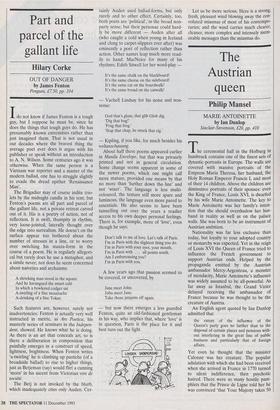Part and parcel of the gallant life
Hilary Corke
OUT OF DANGER by James Fenton Penguin, f7.50, pp. 104 Ido not know if James Fenton is a tough guy, but I suppose he must be, since he does the things that tough guys do. He has presumably known extremities rather than just imagined them. That is not usual in our decades where the bravest thing the average poet ever does is argue with his publisher or speak without an introduction to A. N. Wilson. Some centuries ago it was otherwise. When the same person is a Vietnam war reporter and a master of the modern ballad, one has to struggle slightly to evade the dread epithet 'Renaissance Man'.
The Brigadier may of course indite trio- lets by the midnight candle in his tent; but Fenton's poems are all part and parcel of the gallant life, not a private retreat carved out of it. His is a poetry of action, not of reflection. It is swift, thumpity in rhythm, very loose-jointed, laterally thought over the edge into surrealism. He doesn't on the surface appear too bothered about the number of stresses in a line, or to worry over switching his stanza-form in the course of a poem. He is regularly allegori- cal but rarely does he use a metaphor, and a simile never; nor does he seem concerned about naiveties and archaisms:
A shrieking man stood in the square And he harangued the smart café In which a bowlered codger sat A-twirling of a fine moustache A-drinking of a fine Tokay.
Such features are, however, surely not inadvertencies: Fenton is actually very well instructed in metric, as Ars Poetica, his masterly series of seminars in the Indepen- dent, showed. He knows what he is doing. As there is an art that conceals art, so is there a deliberation in composition that painfully emerges in a construct of speed, lightness, brightness. When Fenton writes `a-twirling' he is climbing up pastiche (of a broadside ballad) to rise to higher things, just as Betjeman (say) would flirf a cunning `morn' in his ascent from Victorian vers de societe.
The Betj is not invoked by the blurb, which inadequately cites only Auden. Cer- tainly Auden used ballad-forms, but only rarely and to other effect. Certainly, too, both poets are 'political', in the broad non- party sense; but their personae could hard- ly be more different — Auden after all (who caught a cold when young in Iceland and clung to carpet-slippers ever after) was eminently a poet of reflection rather than action. Other names leap much more read- ily to hand: MacNeice for many of his rhythms; Edith Sitwell for her word-play —
It's the same chalk on the blackboard! It's the same cheese on the sideboard! It's the same cat on the boardwalk! It's the same broad on the catwalk!
— Vachell Lindsay for his noise and non- sense:
God that's glum, that glib Glob dig. `Dig that bog!'
Trag that frog.'
`SW that chap, he snuck that cig.'
— Kipling, if you like, for much besides his weltanschauung.
About half these poems appeared earlier in Manila Envelope, but that was privately printed and not in general circulation. Some change seems apparent in some of the newer poems, which one might call more mature, provided one means by that no more than 'further down the, line' and not 'wiser'. The language is less multi- coloured, the texture still more spare and luminous, the language even more pared to essentials. He also seems to have been tunnelling out over the years a readier access to his own deeper personal feelings. There is, for example, more of 'love', even though he says:
Don't talk to me of love. Let's talk of Paris. I'm in Paris with the slightest thing you do. I'm in Paris with your eyes, your mouth, I'm in Paris with . . all points south. Am I embarrassing you?
I'm in Paris with you.
A few years ago that passion seemed to be covered, or uncovered, by
Jane meet John. John meet Jane.
Take those jimjams off again.
— but now there emerges a less guarded Fenton, quite an old-fashioned gentleman in his way, who implies that, where 'love' is in question, Paris is the place for it and best turn out the light. Let us be more serious. Here is a strong, fresh, pleasant wind blowing away the con- voluted miasmas of most of his contempo- raries; and the wind carries much clearer, cleaner, more complex and intensely mem- orable messages than the miasmas do.


































































 Previous page
Previous page